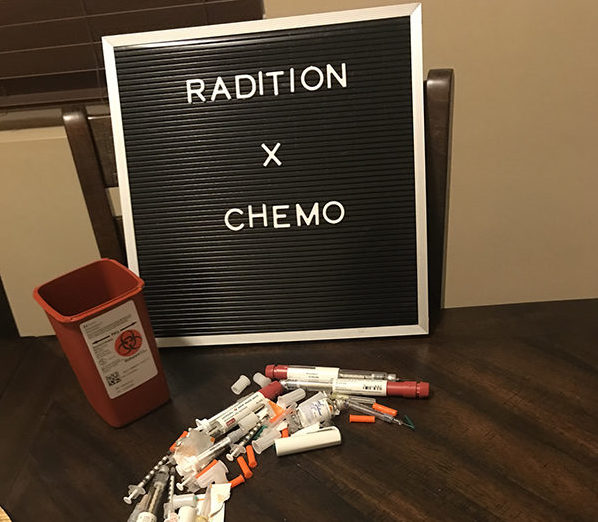Survivor’s guilt. It was a confusing concept to me at first. It is devastating when someone dies from cancer, but I was so desperate to live, I couldn’t imagine feeling bad if I did survive – about anything really. Cancer narrows your focus and immediately makes you realize what is truly important to you. If I survived, I was going to be celebrating on the daily!
Or so I thought. I absolutely celebrate my survival! But, as we’ll talk about in another post, cancer doesn’t end when treatment does. There are many long-term side effects – mental, physical, and emotional. Neuropathy, lymphedema, chronic pain, chronic fatigue, brain fog, alopecia, digestive problems, anxiety and depression, the list goes on. And then there’s survivor’s guilt. That one hits. Hard. Why not me?
Survivor’s guilt, commonly associated with PTSD, is an overwhelming feeling of sadness and guilt some cancer survivors experience. When you survive this life-threatening experience, but others you know and love don’t, immense guilt is understandable and normal. You may also experience guilt about the amount of time and energy invested in you by family and friends when you’re typically the caretaker of others in your family.
There’s also the guilt some people feel when a second chance at life presents itself and you realize you haven’t followed through with all the promises you made while battling cancer. Guilt settles in and you feel depressed as if you somehow blew the new chance at the life you got.
Cancer-related survivor guilt occurs to different degrees in different people. Symptoms of survivor guilt can include flashbacks, nightmares, difficulty sleeping, loss of motivation, irritability, a sense of numbness, and thoughts about the meaning of life. You may be plagued with thoughts of worthlessness and in extreme cases, thoughts of suicide, because you’re allowed to continue living and someone else wasn’t.
While there is nothing that can take away your sorrow, there are things you can do to ease some of the pain of survivor’s guilt. Here are some thoughts that have helped others cope.
Acknowledge Your Feelings
Simply acknowledging that your feelings are present and real is important. These feelings are a sign that you have empathy and truly care about people – it’s okay to feel this way. Ask yourself why you are feeling guilty about surviving when your loved one did not. Are you feeling guilty because you’re not living life the way you feel you should? Certainly, feelings like this can be a motivator to make lifestyle changes that you think are important. On the flip side, you don’t have to prove you are worthy, or that you “deserve to survive.” You don’t have to justify your survival. You don’t owe anyone anything for your second chance at life.
Allow Yourself to Grieve
Have you allowed yourself time to grieve, both your experience and the loss of a friend or loved one? When we are living with cancer, many things end up on the back burner, and one of those things can be grieving when we need to grieve. There is no set amount of time that people should grieve, and everyone grieves in their own way. Give yourself permission to work through your feelings in the way that works for you alone.
Remember Your Friend Through an Act of Kindness
This is one of my favorites. Remembering someone you cared for them through an act of kindness for another may uplift any sorrow you are feeling. When you do them with someone special in mind, you’re keeping their memory alive while giving yourself a purpose to your life. This doesn’t need to be expensive. It can be a heartfelt, handwritten thank you note, a donut delivery to the nurses at the hospital, or volunteering for an organization that was important to your lost loved one.
Celebrate Your Survival
Yes! Celebrate! It can be hard, or confusing, but think about what your friend would wish for you at this time. S/he would want you to celebrate! Picture your friend cheering you on as you learn how to live and thrive after your journey with cancer.
Get Support
Sometimes talking to other people who have “been there” is priceless. It certainly has been for me! In addition to feeling support yourself, being an ear for someone else who is struggling can give you a sense of purpose. You are not alone, and these groups, whether in-person or online, allow you to process these feelings with others who understand.
In addition, you can seek out a professional that has experience with survivor’s guilt to help you cope with the feelings it causes. This can be particularly helpful if you find that that these feelings are becoming more intense or are interrupting your daily life and functioning. There is no shame in seeing a therapist or other mental health provider – this is just as important as your physical health!
Last Note
If you are in Nebraska, there is an amazing program called “A Time To Heal” which leads survivors in a step-by-step process to regaining health and happiness after cancer, including dealing with these type of feelings. I participated when I was told I was in remission, and I can’t speak highly enough about my experience!
Love to all – have a wonderful day! Give someone a hug, smile at a stranger, find the beauty in something simple today.
xx,
Tay



